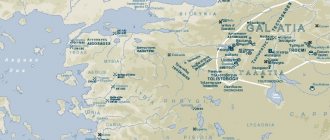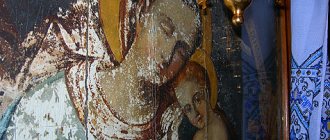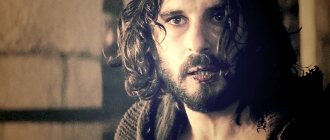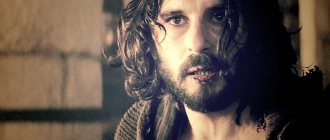The walking of Jesus Christ and the Apostle Peter on the waters... (Matthew 14:22–33)
Amazed by the miraculous multiplication of loaves, the people wanted to take Jesus Christ by force and proclaim him King. The Lord saw these intentions and hastened to prevent their fulfillment. AND IMMEDIATELY
, after performing a miracle,
JESUS FORCED HIS DISCIPLES
, who did not want to be separated from Him especially now, when it seemed to them that the hour of fulfillment of their cherished hopes was coming - to see Him as the King of Israel, but He commanded and had to be obeyed:
ENTER THE BOAT AND GO FIRST, HE WENT TO THE OTHER SIDE
, to the western shore of the Sea of Galilee, to another Bethsaida, which was near Capernaum,
UNTIL HE LET THE PEOPLE GO
.
The Lord wanted to teach His apostles not to pursue human glory, not to attract crowds to themselves for this purpose, and at the same time wanted them to think better, alone, without Him, into the miracle in which they themselves were participants, and the visible evidence which (baskets of bread) was in their hands. In the gathering twilight at sunset, He said goodbye to the disciples, meekly and gradually calmed the people's unrest, convinced everyone to disperse, AND
,
LETTING THE PEOPLE AWAY
,
HE WENT UP TO THE MOUNTAIN TO PRAY ALONE
.
The murder of His beloved Forerunner told Him that the hour of His suffering was approaching; but even earlier, how much labor and sorrow He had to endure in the fight against the Pharisees’ bitterness! And now, in the solitude of the night, He longed to strengthen His human nature in prayerful conversation with His Heavenly Father. And He teaches us by His Divine example: when the time for prayer comes, put aside all worldly cares and raise our minds to Heaven, so that our prayer, like a fragrant censer, ascends to God. He spent almost the entire night in prayer, teaching us patience and zeal in this holy work. AND IN THE EVENING I STAYED THERE ALONE
, on a deserted mountain.
“Why does the Lord ascend the mountain? - St. Chrysostom asks and answers: - In order to teach us how convenient the desert and solitude are when we need to pray to God. Such a place and night time dispose us to quiet prayer. For the desert is the mother of silence, peace and haven, sheltering us from all anxiety.” Meanwhile it became dark; a storm began to howl in the mountains; the wind rushed from the gorges; the sea was raging, AND the BOAT
of the apostles at that time
WAS ALREADY IN THE MIDDLE OF THE SEA
,
AND IT WAS BATTLED
BY FERIC
WAVES
.
Sailing away from the shore, the disciples perhaps thought that the Lord would join them where it would be convenient for the boat to land; but here it is night, and He is not visible... In vain the experienced fishermen worked their oars until exhaustion; the boat was ready to capsize from the breaking waves; BECAUSE THE WIND WAS OPPOSITE
.
“Why did He not bring down the winds from His treasures and He who rules over the power of the sea did not bring forth a favorable wind for His disciples? He did this in order to accustom them to the disasters that faced them during the preaching of the Gospel throughout the entire universe” (words of Nicephorus, Bishop of Astrakhan). It was well after midnight, and the boat was barely halfway there. “Previously, during a storm, Christ Himself was with them on the ship and, moreover, slept, in order to calm them down; now, leading them to greater patience, he leaves them, allowing the storm to overtake them in the middle of the sea; Before the storm was during the day, now it is at night” (St. John Chrysostom). The Lord saw them in distress while swimming, but left them to fight the waves all night in order to touch their hard hearts, because “their hearts were hardened,” says the Evangelist Mark (Mark 6:52). This was to produce fear, excited both by the storm and by the night. At the same time, the Lord disposes them to a strong desire to be with Him and to constant remembrance of Him. That is why He did not immediately appear to them, although He, invisible, is always close to them. IN THE FOURTH WATCH OF THE NIGHT
(after three o'clock in the morning)
JESUS WENT TO THEM
,
WALKING ON THE SEA
as on dry land.
For their own benefit, it was necessary to hurry to salvation, and now He seemed to want to pass them by in order to encourage them to pray and cry out for help. AND THE DISCIPLES
,
SEEING HIM WALKING ON THE SEA
,
WERE ALARMED AND SAID: THIS IS A GHOST
, a night apparition, through which the devil, according to the belief of the Jews, frightens people,
AND THEY CRY OUT OF FEAR
and began to cry out to God for salvation.
“The Lord did not suddenly reveal Himself to the disciples. It is impossible for a person to endure prolonged and strong temptations; therefore, the Lord, wanting the righteous to gain more, increases the trials before the end of their exploits.” BUT, as soon as they exclaimed, JESUS
, as if stopped and detained by a cry of despair,
IMMEDIATELY SPEAKED TO THEM AND SAID: BE OF CHARM;
THIS IS ME , for whom nothing is impossible,
DON'T FEAR
.
In the darkness of the night, the disciples could not find out who this walker on the waves was; but the voice of the Divine Teacher, so familiar to their hearts, immediately dispelled their fear and inspired courage. They were about to receive Him in the boat, but suddenly Peter stepped forward, “always fiery, always warning the disciples”: PETER SAID IN ANSWER TO HIM: LORD!
IF IT IS YOU (I have no doubt that it is You - who but You can walk on the sea as on dry land?),
COMMAND ME
, You just command me
to COME TO YOU ON THE WATER
.
“He didn’t say: pray and call on God for help, but they led him. You see how much heat there is, although Peter is often exposed to danger because he asks for too much, for here too he asked for too much, however, out of love alone, and not out of boasting. He did not say, command me to walk on the waters, but to come to You. Peter was confident that Jesus could not only walk on the sea Himself, but also lead others.” The heart-reader knew how Peter’s daring attempt to walk on the waves would end; He did not say to him: “I command”; did not say: “Come to Me,” but simply: “Go,” if you want (St. John Chrysostom). HE SAID: GO
.
“If Christ had said, “You cannot,” then Peter, in his ardor, would have contradicted here too. Therefore, Christ by deed convinces him to be more careful in future. But even this does not deter Peter, says St. Chrysostom. – He wants to show that his faith, his love for the Savior is stronger than that of the other apostles. So later he assured: “even if everyone is offended because of You, I will never be offended” (Matthew 26:33). But experience showed that this time too he was too arrogant and lacking in faith.” AND
COMING OUT OF THE BOAT
,
PETER
stepped firmly onto the boiling waves, and while his gaze was fixed on the Lord, the wind vainly tore his hair and the waves splashed his clothes
; he joyfully WALKED ON THE WATER
, rejoicing not in walking on the waves, but in order to
APPROACH
JESUS
before others and throw himself at His feet.
So miracle follows miracle: not only the Creator and Lord of the sea, but also the servant, by the power of His permission, walks on the waters as on dry land... “But having overcome the difficult, Peter almost suffered harm from the easiest. Such is human nature: often having succeeded in great things, it becomes difficult with small things,” says St. Chrysostom. When Peter looked at the furious waves and the dark abyss below him, flesh and blood spoke in him: BUT
,
SEEING THE STRONG WIND
,
HE WAS AFRAID AND
,
BEGINNING TO DROWN
,
SCREAMED
in a voice of despair:
LORD!
SAVE ME .
It was not a storm of water that threatened him, but a storm of doubtful thoughts, just as it was not the density of the water that kept him on the waves, but the strength of his faith... Fear forced him to sincerely admit the weakness of his faith, and the Lord did not hesitate with His help: JESUS IMMEDIATELY STRETCHED OUT HIS HAND
,
SUPPORTED HIM
... But Why didn’t the Lord command the winds to calm down, but Himself supported Peter?
Because it was not the wind that was to blame for his drowning, but his cowardice; and Christ does not tame the wind, but this cowardice. “Peter’s faith was needed, but it turned out to be a lack, and so the Lord lovingly reproaches him and SAYS TO HIM: YOU OF LITTLE FAITH!
WHY DID YOU DOUBT? He does not say - unfaithful, but “of little faith”; doesn’t say, “why did you go?” therefore, he does not want to cool the future zeal of His apostles, but encourages them, shows them that with His help they can do everything. All things are possible to him who believes.” “Like a chick that has prematurely flown out of the nest and is ready to fall to the ground, the mother places it on her wings and carries it back to the nest; so did Christ.” This taught Peter not to be arrogant, and it calmed the other disciples so that they would not envy Peter. What happened to him at sea foreshadowed his renunciation and subsequent conversion and repentance. AND
WHEN THEY ENTERED THE BOAT
,
THE WIND DIED
, the storm immediately subsided and the sea became calm.
Witnesses of the miracle were extremely amazed and amazed; When the Lord previously calmed the storm with a word, they said: “Who is this, that even the winds and the sea obey Him?” (Matt. 8:27). And now the apostles and others, WHO WERE IN THE BOAT, APPROACHED
HIM in reverence,
WORSHIPED HIM AND SAID: TRULY YOU ARE
THE MESSIAH,
THE SON OF GOD
.
LiveInternetLiveInternet
Holy Apostle Andrew the First-Called is one of the twelve apostles chosen for preaching the Gospel. According to legend, he preached in Scythia and erected a cross on the Kyiv Mountains, on the site of the future city of Kyiv. St. Apostle Andrew was born in the city of Bethsaida in Galilee, and subsequently lived with his brother Simon (Peter) in Capernaum, on the shores of Lake Gennesaret, earning his livelihood by fishing. Already from a young age, Apostle Andrew was distinguished by his prayerful striving towards God. He did not marry, but became a disciple of St. Prophet John the Baptist, who announced the Incarnation. When St. John the Baptist pointed to the Jordan to St. to the apostles Andrew and John the Theologian on Jesus Christ, calling Him the Lamb of God, they immediately followed the Lord. As the Gospel tells us, St. Apostle Andrew was not only the first to follow the call of the Lord, which is why he received the name First-Called, but he was also the first of the apostles to confess Him as Savior, bringing his brother Simon, the future Apostle Peter, to Christ. From the Gospel we learn that St. the apostle Andrew was with the Lord Jesus Christ during the miracle of the five loaves that fed five thousand people (John 6:8-9), spoke with the Lord on Palm Sunday (John 12:22), asked Him together with the apostles Peter, James and John on the Mount of Olives about the future destruction of Jerusalem and the signs of the Second Coming of the Savior (Mark 13:3-4; Matthew 24:1-14; Luke 21:5-19). After the Resurrection and Ascension of Christ, which was also witnessed by St. Andrew, he returned to Jerusalem. Here, on the day of Pentecost, together with the other apostles and the Most Holy Theotokos, Apostle Andrew was filled with the Holy Spirit (Acts 1:13; 2:1-4), as the Lord himself predicted. With the preaching of the Word of God, St. The Apostle Andrew made several trips, during this period he returned to Jerusalem three times. As the historian Eusebius of Caesarea reports: “Thomas was chosen for Parthia, John for Asia, and Andrew received Scythia as an inheritance.” His third journey of St. The Apostle Andrew the First-Called went to Chersonesus, where he stayed for a long time. The chronicle preserves a description of the path of the Apostle Andrew. He preached in these parts many times; tradition points to a depression on the stone formed by the apostle’s foot; the water that was contained in it healed the sick. The ruins of ancient temples, whose foundations date back to the 1st century, have survived to this day, and among them are traces of the ancient temple of St. Andrew with a throne carved in his name on the rock. From here the Apostle Andrew made his journey along the Dnieper, which was then called Borysthenes. By revelation of God, the saint stopped in those places where the city of Kyiv is now located. After a night spent in prayer, St. The apostle raised the Cross and, filled with the prophetic spirit, said to his disciples: “Do you see these mountains? The grace of God will shine on these mountains: there will be a large city here, and the Lord will erect many churches in it.” Moving further north, the Apostle Andrew reached the Slavic settlements at the site of the future Novgorod and planted his staff near the present village of Gruzino. From here the Apostle Andrew passed through the lands of the Varangians to Rome, and then visited Thrace. Here, in a small village of Byzantium, in the future Constantinople, he founded the Christian Church, consecrating one of the seventy apostles of Christ, Stachy, as a bishop. Thus, the name of the Apostle Andrew connects the Constantinople and Russian Churches. On the difficult path of the evangelist, the Apostle Andrew endured many sorrows and suffering from the pagans; he was expelled from cities and beaten. But the Lord protected his chosen one and through his prayers performed wondrous miracles. The last city where Andrew the First-Called came and where he was destined to suffer martyrdom was the city of Patras, an Achaian city at the entrance to the Gulf of Corinth. The miraculous healings that took place through the prayers of the apostle encouraged the townspeople to accept holy Baptism. However, the ruler of the city, proconsul Aegeat, remained an ossified pagan. The Holy Apostle wanted to reveal to him the Christian secret of eternal life, the miraculous power of the Holy Cross of the Lord, but the governor ordered the Apostle Andrew to be crucified. St. joyfully received. Andrew the First-Called made the decision of the ruler and entered the place of execution, loudly exclaiming: “Rejoice in the Cross, sanctified by the flesh of Christ...” To prolong the torment of the apostle, Aegeates ordered not to nail the saint’s hands and feet, but to tie them to the cross. According to legend, the cross on which St. Apostle Andrew, was of a special shape - it looked like a Roman numeral X. Such a cross is still called St. Andrew's. The radiance of Divine light illuminated the cross and the martyr crucified on it; he gave up his soul to the Lord. This happened in 62. In 357 relics of St. The apostles were solemnly transferred to Constantinople and placed in the Church of the Holy Apostles next to the relics of St. Evangelist Luke and disciple of the Apostle Timothy. After the capture of Constantinople by the crusaders in 1208. relics of St. Andrew were transferred to Italy and placed in the cathedral in Amalfi. Under Pope Pius II in 1458 honest head of St. The apostle was transferred to Rome and laid in St. Peter's Basilica. The Order of St. Andrew the First-Called Apostle was the first and highest order in the Russian Empire. Sovereign Peter I revered the Holy Apostle as his patron and the Russian state. There is no consensus among scientists about the exact date of establishment of the order; 1696 and 1698 are called. The statute of the order was drawn up by the Emperors in 1720, 1729, 1730, 1744, and was legislatively approved only in 1797. He complained only at the discretion of the Sovereign Emperor for military exploits (mainly) and for the civil service of Russia. The order had one degree, and since 1797, diamond jewelry had a special degree of award. By decree of the Sovereign Emperor Nicholas I Pavlovich, since 1855, the insignia of the order received for military exploits was joined by two crossed golden swords placed on top of the cross and on the upper ray of the star. The draft Charter of the Order of St. Apostle Andrew the First-Called, which for several decades remained the only Russian order, was drawn up with the direct participation of Sovereign Peter I. It contained a chapter “On Cavaliers,” which stated what this award should be given for: “... as reward and reward for one for loyalty, courage and various services rendered to us and the Fatherland; and to others for encouragement to all noble and heroic virtues."https://tzarskiy-khram.narod.ru/and.html








